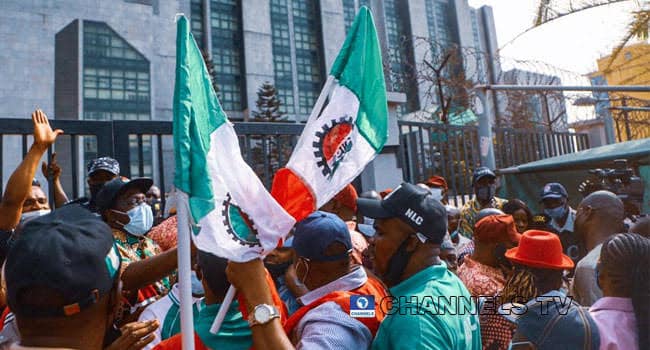Editorial
Fuel Subsidy Removal: NLC, TUC Planned Strike Highlights Plight Of Most Nigerians

In the wake of the latest notice by the organized labour of a nationwide strike starting from Wednesday, August 2, the federal government has called on the unions to reconsider their decision, assuring that it is doing all it can to meet their demands. The irony isn’t lost on Nigerians that President Bola Tinubu who wasted no time in declaring the end of fuel subsidy payment minutes after his inauguration into office is now pleading for more time and patience to address labour’s grievances with are hinged on the administration’s major policy shift that has since left Nigerians reeling from the fallouts.
Two days after the President removed the fuel subsidy, the Nigerian National Petroleum Company Limited (NNPCL) announced a new price regime for petrol ranging from N537 to N600 per litre from the N185 hitherto price. This instantly worsened the inflationary trend in the country which was already at over 20 percent at the time. The development got the Nigeria Labour Congress (NUC) and the Trade Union Congress (TUC) spoiling for a show with the government which quickly set up a Presidential Proposal Steering Committee to liaise with labour.
While negotiations between both parties were ongoing, the federal government approached the National Industrial Court in Abuja and, on 5 June, obtained a court order to stop the strike. This forced the Labour leaders to drop their earlier intention to down tools as their members were further pacified by the federal government’s promise to implement a number of palliative measures. These include: Cash Transfers, Social Investment Programme (SIP), Cost of Governance, Energy, Mass Transit and Housing with various sub-committees set up by the negotiation team to work out the modalities in eight weeks.
Speaking after the marathon meeting presided over by President Tinubu’s Chief of Staff, Femi Gbajabiamila, the NLC President, Joe Ajaero, was upbeat that if the solutions and recommendations thrown up are adopted and implemented faithfully by the government, they would go a long way to cushion the fuel subsidy removal. “For instance, we agreed before in the last administration on the issue of Compressed Natural Gas and what to do. If they had implemented the CNG programme, we wouldn’t be here; Nigerians won’t be bothered because we have a substitute,” he said.
Amid the steering committee set up by the government to negotiate with the NLC and the TUC on subsidy removal not making much progress, frantic efforts by the organized labour to have the court order barring them from embarking on strike set aside, the Abuja National Industrial Court judge, Olufunke Anuwe, ruled on June 19 that the order would subsist pending the hearing and determination of the interlocutory injunction filed by the federal government to restrain NLC and the TUC from embarking on the planned strike. After the organized labour issued a fresh strike notice, the federal government quickly reminded them of the restraining order.
However, it’s worthy of note that while the N540 average pump price per litre was being rejected by organized, the prices recently rose to N620 in line with market forces. Yet, the federal government would want NLC and TUC to do nothing about it, as the statement issued yesterday by the Solicitor General of the Federation and Permanent Secretary in the Ministry of Justice, Mrs Beatrice Jeddy-Agba shows.
According to the statement, “It is noted that the issues (removal of fuel subsidy, hike in prices of petrol and consequential increase in the cost of living, etc) which precipitated the above court action are the very same issues over which NLC has now issued another strike notice. The NLC has submitted to the jurisdiction of the court and is being represented by the reputable law firm of Femi Falana, SAN. It is therefore our minimum expectation that the NLC will allow the courts to perform their constitutional roles rather than resorting to self-help and undermining the orders of the court.”
The government should be told that even if it succeeds in restraining its workers, it cannot hold back the greater majority of Nigerians whose lives and livelihoods are terribly being assaulted by the galloping inflation, a decline in the purchasing power of citizens and devaluation of the national currency all caused by the poorly thought-out policies of the government. The woes of the people have now been further compounded by the ongoing strike embarked upon by resident doctors. With hospitals now turning back patients, how can Nigerians already reeling from deprivation, afford Medicare in private hospitals? Naija News hopes that the government does not so push the masses to the wall that they are forced to react. Such a reaction which is always chaotic cannot be contained with a restraining order. There is ominous tension on the streets as it seems the country is only enjoying the peace of the graveyard.
It is for this reason that Naija News advises the federal government to use organized labour’s determination to go on strike as a peep into the frustrations and desperation of Nigerians over the current economic situation. At least the living condition of government workers is not anywhere near those of the over 133 million Nigerians living in multi-dimensional poverty. If the government-imposed austerity measures could so bite the organized labour into demanding N200,000 as the minimum wage with which to get by, what the poor are passing through at this time can then be better imagined! While NLC was mobilizing its members for a strike in June, South-West and Northern state chapters of the Congress read political meaning to the move and resolved to pull out. The fact that there is no dissension this time around should tell the Tinubu government how its policies have democratized hardship among Nigerians.
Rather than hamstringing NLC and TUC with a restraining court order, the federal government should engage the unionists in sincere dialogue with the view to harvesting ideas on how best to ameliorate the catastrophic impacts of the fuel subsidy removal and the floating of the Naira on Nigerians. Having seen the folly in doling out ₦8,000 to 12 million vulnerable households for a period of six months which necessitated the suspension and review of such an idea as palliative, the government should use negotiation sessions to pick the brains of the organized labour on the best cushioning measures and how to implement them to the benefit of all Nigerians who need such interventions.
While at that, the Tinubu government must make haste to roll out the much-needed palliatives or restore the subsidies pending when it devises a means of removing same without visiting this sort of penury on Nigerians or laying out cushioning measures that will mitigate the impact of fuel subsidy removal. The cart should always be at the back of the horse not the other way round, same way analgesics must first be administered before the problematic tooth gets extracted!












